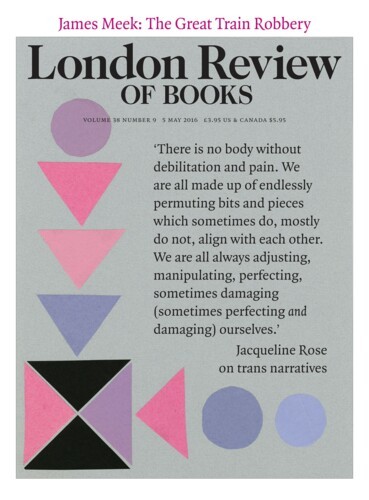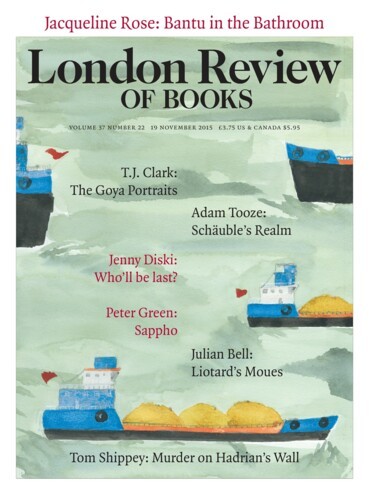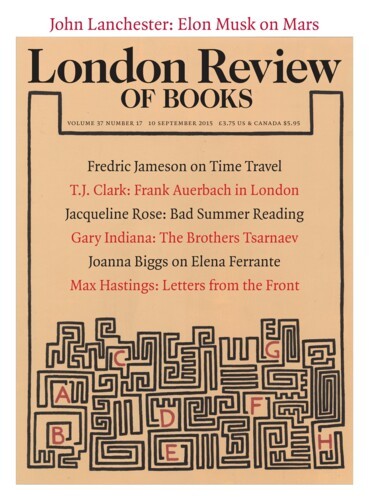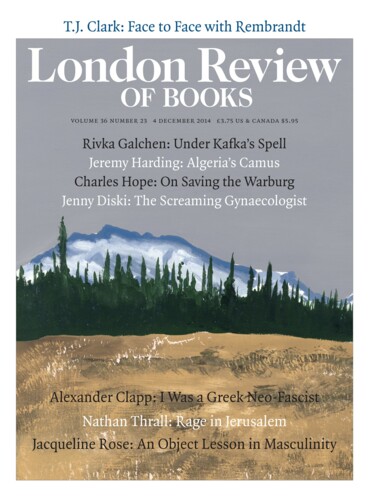Jacqueline Rose
Jacqueline Rose’s next book, a novel, is forthcoming from Fitzcarraldo. She is co-director of the Birkbeck Institute for the Humanities.
Who do you think you are? Trans Narratives
Jacqueline Rose, 5 May 2016
Today, trans people – men, women, neither, both – are taking the public stage more than ever before. In the words of a Time magazine cover story in June last year, trans is ‘America’s next civil rights frontier’. Perhaps, even though it doesn’t always look this way on the ground, trans activists will also – just – be in a position to advance what so often seems impossible: a political movement that tells it how it uniquely is, without separating one struggle for equality and human dignity from all the rest.
Bantu in the Bathroom
Jacqueline Rose, 19 November 2015
On 3 March 2014, the first day in the trial of Oscar Pistorius for the killing of Reeva Steenkamp, Judge Thokozile Matilda Masipa made her way across courtroom GD at North Gauteng High Court in Pretoria slowly and haltingly. She suffers from severe arthritis and for the duration of the trial she sat on an orthopaedic chair, much smaller than the vast leather seats of the two assessors on either side. Judge Masipa’s entry couldn’t have been more different from that of the defendant she was there to judge. According to one observer, Pistorius ‘strode’ up to the dock.
Corkscrew in the Neck: Bad Summer Reading
Jacqueline Rose, 10 September 2015
There seems to be something about having the word ‘girl’ in the title of a book that guarantees huge sales. First, Gone Girl, by Gillian Flynn, which I – like many readers, I assume – couldn’t put down, but which on reflection I found deeply repellent (more than one or two critics have concurred). Apparently the film is even worse, as in, even more misogynist,...
At the Donmar
Jacqueline Rose, 4 December 2014
In the latest Coors Light Ice Bar cinema advertisement, Jean-Claude Van Damme slices through enormous ice blocks with his bare hands and shatters them with a single thrust of his legs. Perhaps it was because I saw the ad within 24 hours of Phyllida Lloyd’s extraordinary all-female production of Shakespeare’s Henry IV, which ends its sell-out London run on 29 November, that the...
Podcasts & Videos
Jacqueline Rose discusses her book On Violence and On Violence Against Women with Jude Kelly.
Short Cuts: My Evening with Farage
Jacqueline Rose
Jacqueline Rose reads her piece on the connections between Frank Kermode and Nigel Farage.
Women in Dark Times
Jacqueline Rose
Jacqueline Rose discusses the parallels between Rosa Luxemburg and Marilyn Monroe, with Hilary Harper.
On Freud, Zionism, Sylvia Plath and more
Jacqueline Rose
Jacqueline Rose discusses the full range of her work with Justin Clemens at the 2013 Melbourne Writers Festival.
A Rumbling of Things Unknown: Marilyn Monroe
Jacqueline Rose
Jacqueline Rose asks, for whom or what in 1950s and early 1960s America was Marilyn Monroe carrying the can?
Reading Jacqueline Rose
Jacqueline Rose and Paul Myerscough
Paul Myerscough talks to Jacqueline Rose about her career, from her groundbreaking work on feminism in the 1970s through to her more recent writings on Zionism and the place of fantasy in the world of...
Pieces about Jacqueline Rose in the LRB
Ruthless and Truthless: Rotten Government
Ferdinand Mount, 6 May 2021
Boris Johnson’s japes are comparable in neutralising effect to the softening charm of Tony Blair. How can such a matey, blokey person, ‘someone you could have a pint with’, possess darker, colder...
Protests with Parasols: Proust, Dreyfus, Israel
Michael Wood, 20 December 2012
‘Profonde Albertine’, the narrator writes close to the end of Proust’s novel. By ‘deep’ – profonde – he means ‘unreachable’. She was mostly...
Ruin and Redemption: psychoanalysing Zionism
David Simpson, 23 June 2005
Jacqueline Rose has written a timely and courageous book. One immediate sign of this is its dedication to the late Edward Said, and its rewriting of the title of one of his most important books,
A Mere Piece of Furniture: Jacqueline Rose’s take on Proust
Dinah Birch, 7 February 2002
There are good reasons, and a few bad ones, for lifting minor characters out of famous texts and putting them centre-stage. One bad reason might be that refiguring a large reputation quietly...
Homelessness
Terry Eagleton, 20 June 1996
In the days of F.R. Leavis, English literary criticism was wary of overseas, a place saddled with effete, Latinate languages without pith or vigour. Proust is relegated to a lofty footnote in...
Slick Chick
Elaine Showalter, 11 July 1991
We all know the story. A brilliant, neurotic young American woman poet, studying on a fellowship at Cambridge, meets and marries the ‘black marauder’ who is the male poet-muse of her...
Read anywhere with the London Review of Books app, available now from the App Store for Apple devices, Google Play for Android devices and Amazon for your Kindle Fire.
Sign up to our newsletter
For highlights from the latest issue, our archive and the blog, as well as news, events and exclusive promotions.




